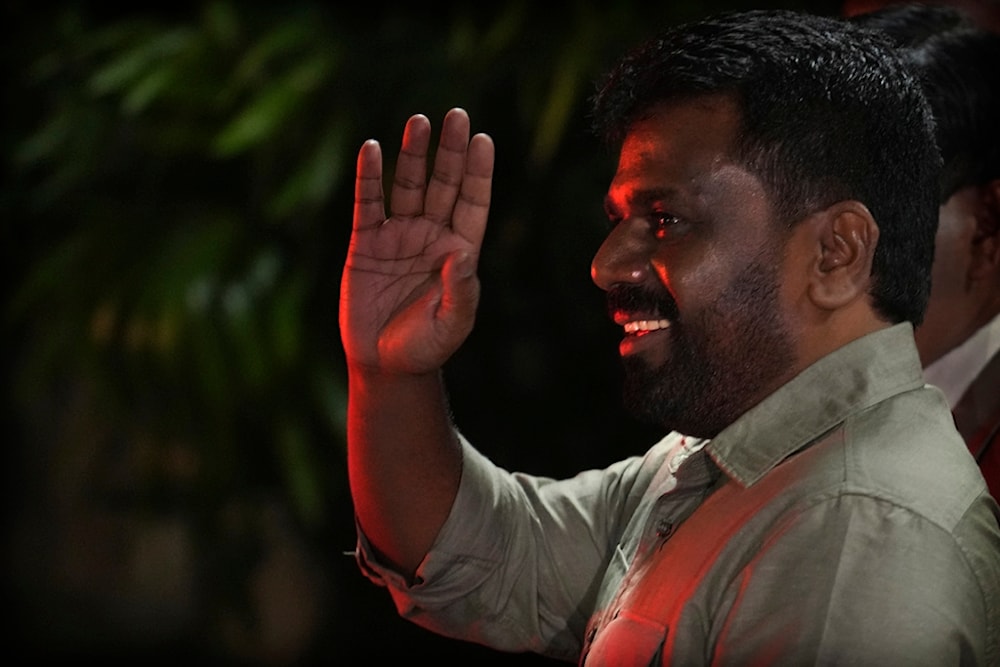Sri Lanka elects Marxist Dissanayake as president to save economy
Dissanayake has secured 5.6 million votes, or 42.3% of the total, a major improvement from the 3% he garnered in the 2019 presidential election.
-

Anura Kumara Dissanayake waves as he leaves the election commission office after winning the Sri Lankan presidential election, in Colombo, Sri Lanka, Sunday, Sept. 22, 2024. (AP)
Sri Lankans elected Anura Kumara Dissanayake as their new President on Sunday, entrusting him with combatting corruption and strengthening the country's fragile economic recovery following its worst financial crisis in decades.
Dissanayake ran under the banner of the National People's Power alliance, which includes his Marxist-oriented Janatha Vimukthi Peramuna (JVP) party.
Dissanayake, 55, maintained a strong lead throughout the vote count, ultimately defeating incumbent President Ranil Wickremesinghe and opposition leader Sajith Premadasa.
"We believe that we can turn this country around, we can build a stable government... and move forward. For me this is not a position, it is a responsibility," Dissanayake said after his victory was confirmed following a second round of vote counting.
The election was seen as a test for Wickremesinghe, who managed to guide the heavily indebted nation through a delicate economic recovery. However, the austerity measures that accompanied this process angered many voters, and Wickremesinghe finished third with just 17% of the vote.
"Mr. President, here I handover to you with much love, the dear child called Sri Lanka, whom we both love very dearly," Wickremesinghe, 75, told Dissanayake in a statement conceding defeat.
Dissanayake secured 5.6 million votes, or 42.3% of the total, a major improvement from the 3% he garnered in the 2019 presidential election. Premadasa followed with 32.8%.
For the first time in Sri Lanka’s history, the presidential election was decided by a second vote count after none of the candidates achieved the required 50% in the first round.
Under the country’s electoral system, voters rank their top three choices. If no candidate secures a majority in the initial count, a second round is conducted, with the top two candidates facing off based on preferential votes.
Approximately 75% of the 17 million eligible voters participated, according to the election commission.
This was the first election since Sri Lanka's economy collapsed in 2022 due to a severe foreign exchange shortage, leaving the country unable to import essential goods like fuel, medicine, and cooking gas. The economic crisis led to widespread protests and forced then-President Gotabaya Rajapaksa to flee and eventually resign.
Dissanayake presented himself as the candidate for change, appealing to those burdened by austerity measures tied to a $2.9 billion International Monetary Fund (IMF) bailout. He promised to dissolve parliament within 45 days of taking office and seek a fresh mandate for his policies through general elections.
Despite concerns among investors about his pledges to cut taxes and restructure $25 billion in debt, Dissanayake showed a more appeasing tone during his campaign, assuring that all reforms would be conducted in consultation with the IMF and that he remained committed to debt repayment.
He will now face the challenge of ensuring Sri Lanka adheres to the IMF programme through 2027 to achieve stable economic growth, restore market confidence, manage debt repayment, attract investment, and lift a quarter of the population out of poverty.
Read more: Sri Lanka's inflation drops to record low ahead of key election

 3 Min Read
3 Min Read








